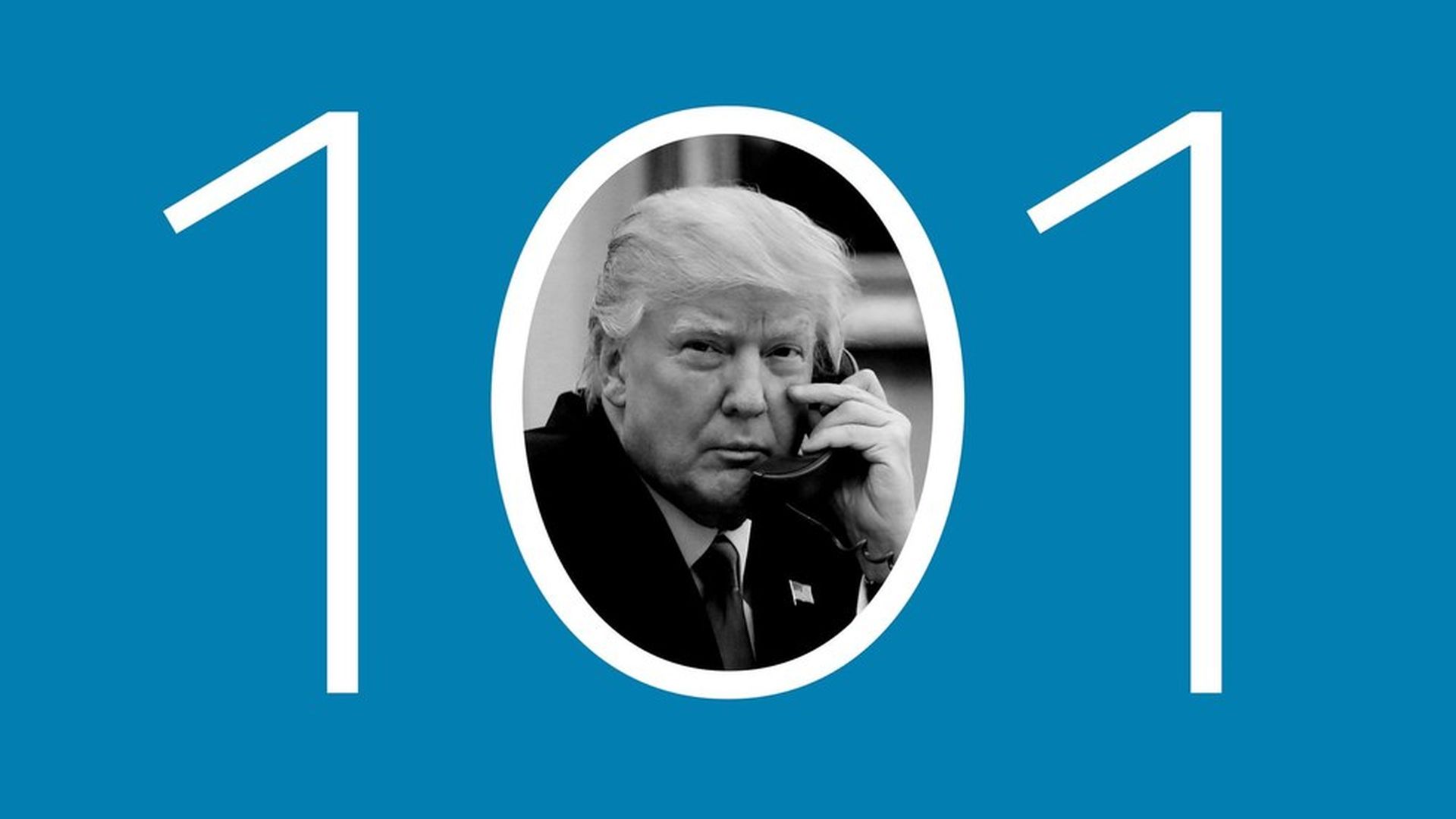Trump 101: one thing he really believes
Add Axios as your preferred source to
see more of our stories on Google.

Photo illustration by Lazaro Gamio / Axios
President Trump often pops off more for effect than out of core conviction, but there's one thing he has believed constantly for 30 years: America should be tougher on trade and retaliate against foreign governments who he thinks rip the U.S. off.
Back in 1987 Trump gave a speech to the Rotary Club in Portsmouth, N.H., that the New York Times covered like a teaser to a presidential race. Trump's longtime collaborator Roger Stone, who was with Trump that day, tells us the speech — reinforced by full-page newspaper ads — lays out unchanging elements of Trump's worldview.
Trump's three unshakable beliefs:
- America sends the wrong people to negotiate. The American government, Trump believes, needs more cutthroat types and fewer social workers. He believes his own brilliance and force of personality can overwhelm everything from the permanent bureaucracy to foreign nations. Trump said in Portsmouth: "There is a way you can ask them [foreign countries] and they will give it, if you have the right person asking … I'm tired of nice people already in Washington. I want someone who is tough and knows how to negotiate."
- Foreign countries rip off America. Trump believes this happens not only in trade, but in national security. According to the Times, Trump told the Portsmouth audience that he was tired of the United States "being kicked around" by allies like Japan, Saudi Arabia and Kuwait, which have become "the world's greatest money machines" because the U.S. pays for their defense.
- American leaders should retaliate. Trump, already ignoring the norms of international laws and diplomacy, suggested in Portsmouth that the United States should attack Iran and seize some of its oil fields in retaliation for what he called Iran's "bullying of America." He also said that instead of raising taxes, America "should have these countries that are ripping us off pay off the $200 billion deficit."
The roots of Trump's protectionist views go all the way back to the union-friendly environment where his father, Fred, worked as he courted Democratic politicians, according to Trump biographer Harry Hurt. It's also linked to who lived in Trump housing projects, "the kind of people that might be affected by protectionist trade policies in what they may consider to be a positive way," Hurt says. That helped create Trump's personal branding as a "blue-collar billionaire," Trump biographer Michael D'Antonio says. He sympathized with autoworkers fighting the tide of imports coming from Japan, and in the 1980s Trump was railing at a "bogeyman in the form of a foreign competitor," according to D'Antonio. The tactic worked, getting him attention and political traction.
Culturally, though born a millionaire, Trump was from Queens and hated being looked down upon by Manhattan elites. And he viewed unfair trade as a humiliation of the U.S. "A lot of what he does in his life is about humiliating opponents and then avoiding or defending against humiliation himself," D'Antonio says.
Why this matters: Trump will inevitably ditch or scale back some of his less realistic promises. But if you're trying to predict the issues on which he'll stay the course, start with this narrow set of beliefs he's held for decades. An aide tells us Trump's views on trade only sharpened on the campaign trail as he spent time meeting unemployed factory workers in Rust Belt towns.
And for further evidence of his determination, look at the men he's brought into his White House: an economic nationalist, Wilbur Ross, to run his Commerce Department; a China trade hawk, Peter Navarro, as director of the newly-created National Trade Council; and two key slots — chief strategist and senior policy adviser — to the most diehard populist nationalists of all: Steve Bannon and Stephen Miller.
When was the last time anybody saw us beating, let's say, China in a trade deal? They kill us. I beat China all the time. All the time.— Trump at 2015 presidential campaign kickoff
